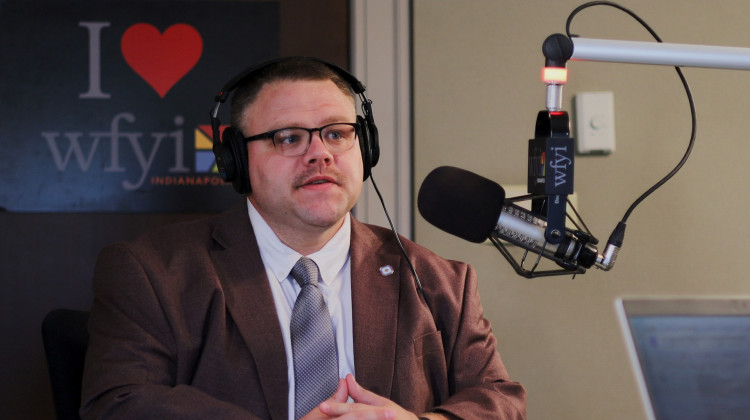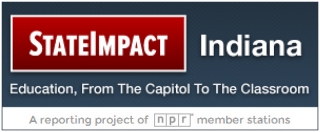
Testing expert Ed Roeber travelled to Indiana Tuesday to speak with the panel rewriting the state’s assessment. Roeber encourage the panel to spend at least two years creating and implementing the new assessment system and not rush into it, like Indiana did in 2014.
Claire McInerny/Indiana Public BroadcastingThe panel rewriting the state’s assessment met for the third time on Tuesday, and the group is concerned about meeting its December deadline.
The General Assembly created the panel to get recommendations for the ISTEP+ overhaul before the 2017 session. That comprehensive list must be completed by December 2016.
But that only gives the panel four more months to come up with their list of recommendations, and on Tuesday that timeline came into question.
The test is given to third- through eighth-graders and one final time in high school. The state abandoned Common Core Standards in 2014 and wrote its own test.
Ed Roeber is a testing expert based out of Michigan and consulted the state on the 2014 rewrite. He advised against dropping current standards, writing new ones and creating a test that matched those standards all in one year. He said there would be issues with implementing the test. The state also hired him to advise ways to shorten the test.
Today he warned the group against compressing the work into a short time and repeating the mistakes from 2014.
“Get it right,” Roeber said. “I don’t want to come back in a couple years when the next replacement is being talked about.”
But Roeber is back, and in this meeting, he advised the ISTEP+ panel that it takes a minimum of two years to develop a new assessment program, hire a vendor, develop the assessment instruments, field test them, revise the assessment and prepare for the actual test. Other consultants have also given this advice.
The panel repeatedly called on Roeber to answer additional questions about the role of a statewide assessment. Many around the state have discussed using this new version of the ISTEP+ to serve two functions: to give the federal government a summary of what a student learned in a year (how the current ISTEP+ works) and to give teachers a progress report throughout the year of what students are learning (like the NWEA test many schools currently use).
Roeber told the panel the second is not a realistic expectation for this new assessment.
“The state test is not the place to inform a classroom teacher about what kids do and don’t know,” Roeber said.
In the two earlier meetings, the panel heard from testing experts from around the country. Members discussed high stakes testing and classroom impact. So far, they haven’t established any detailed recommendations to include in their report.
After Roeber’s recommendation in the third meeting, the group discussed moving the December deadline.
Rep. Bob Behnning, R-Indianapolis, wrote the legislation that got rid of the current version of the ISTEP+, created the panel and set the December deadline. He said, if the panel needs more time to make the recommendations, he could ask the General Assembly to create new legislation extending this deadline.
“It wouldn’t be bad if we said we need more time,” Behnning said. “Or we need to really look at doing the alternative [Roeber] talked about doing. Let’s keep what we have in place while we do some testing and pilots where we want to go long term.”
That would mean schools would continue administering the ISTEP+ in its current form while the state developed a new version. Behnning said, if they choose to take this route, legislators would have to understand it would be more expensive for a few years.
The next meeting for the panel is Aug. 9.
 DONATE
DONATE









 Support WFYI. We can't do it without you.
Support WFYI. We can't do it without you.